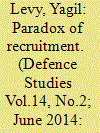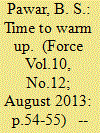| Srl | Item |
| 1 |
ID:
129959


|
|
|
|
|
| Publication |
2014.
|
| Summary/Abstract |
This article compares six cases between the US and Israel in the areas of anti-war mobilization and its impact on military deployment, force protection, and prisoners' swap. It argues that the more the recruitment is built on state-coercion rather than market regulation, the higher the state's sensitivity to the well-being of its soldiers because the likelihood for collective action focused on military issues is higher. The power of republican discourse, the coercion of recruitment on powerful, but sometimes also unwilling enlistees, and the favoring of voice over exit all cause the state to increase its commitment to its soldiers. At the extreme, the state may even favor soldiers' lives more than its commitment to protect the citizens.
|
|
|
|
|
|
|
|
|
|
|
|
|
|
|
|
| 2 |
ID:
095978


|
|
|
| 3 |
ID:
126217


|
|
|
|
|
| Publication |
2013.
|
| Summary/Abstract |
A military doctrine provides the basic principles that shape the way a nation's military forces are employed to achieve national objectives and creates the appropriate framework for response to national security issues. Doctrinal assessments are self-administered and require significant input in both the military and political spheres. The resulting declared doctrine is, thus, a carefully crafted article having been scrutinised at both political and military levels. A doctrine gives a clear insight into the kind of wars/conflicts states may anticipate and choose to deploy/employ the military force. In short, understanding the use, importance and reliance on doctrinal formation is critical to how states weigh military/national capabilities.
|
|
|
|
|
|
|
|
|
|
|
|
|
|
|
|